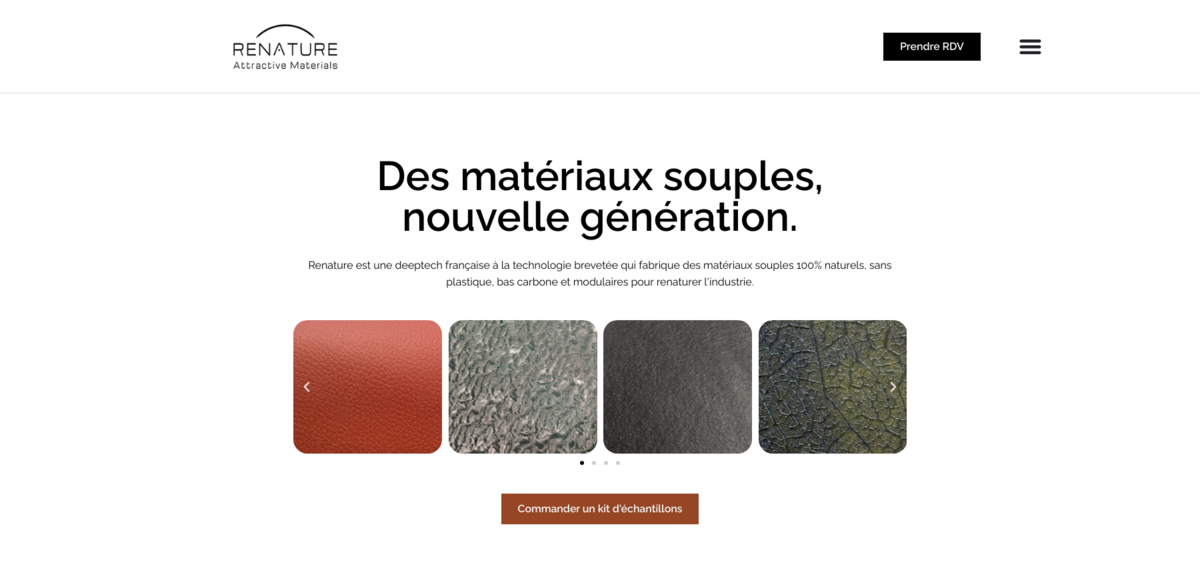Project Overview: Soft Materials, New Generation
Renature is a French DeepTech with patented technology that manufactures 100% natural, plastic‐free, low carbon, and modular soft materials to renature the industry. This groundbreaking project introduces Phyli®, the first 100% bio-circular soft material designed to replace leather, synthetic leather, or rubber. Built from French agro-food co-products and by-products, Phyli® combines the robustness of plant tannins with the naturalness of plant proteins to deliver a solution that is as desirable as it is sustainable. The technology is at the heart of a new bio-economy, supporting brands in their sustainable growth challenges and paving the way for a future where soft materials are both eco-friendly and premium. It all comes together in a unique approach that not only aims to introduce a material revolution but also to reframe the standards of sustainability in the industry…
Main Benefits and Key Figures
The project’s strengths are clearly visible in the impressive credentials of its technology and applications. The key figures and facts illustrate why this innovation is generating buzz across multiple sectors:
- 100% Natural: No plastic, solvents, or harmful chemicals are used.
- Low Carbon: Employs a minimalistic green process with natural ingredients.
- Bio-Based: Values renewable organic material of plant and mineral origin only.
- Customizable Desirability: Offers a range of customizable colors, textures, and thicknesses.
- Plastic-Free: Emphasizes environmental responsibility by eliminating plastic from the manufacturing process.
Innovative Phyli® Technology
At the core of the project lies the patented Phyli® technology. It is the first of its kind to offer a 100% natural alternative to traditional soft materials while also being recyclable and even compostable at home. The formulation leverages plant tannins and proteins to produce a robust yet remarkably natural product. The technology’s uniqueness is further underlined by the fact that it does not require water during the process—a detail that enhances its eco-friendly profile and positions it as a pioneer of sustainable bio-circular soft materials. This groundbreaking method not only ensures durability and performance but also meets the increasing demand for green, renewable solutions in high-end markets.
Customization and Versatility
A notable aspect of this material innovation is its unmatched versatility and potential for customization. Phyli® is available in a catalog that currently includes five references, yet it can be custom-made to suit a broad color range—from very dark hues to pastel shades. Additionally, variations in textures and thicknesses (ranging from less than 0.5mm to 1.1mm) offer designers the flexibility to tailor the finish for a personalized touch. The material is also available in diverse shapes such as sheets, rolls, and granules, and can be supplied on natural or textile support with or without additional options like screen printing and marking. Such flexibility makes it ideally suited for projects requiring a delicate balance between aesthetics and sustainability…
Applications Across Industries
The adaptability of Phyli® extends its impact across several high-demand sectors. In premium packaging, the material transforms cases, boxes, and displays into icons of sustainable luxury. In the realms of jewelry and watchmaking, the natural product is employed in watch straps and accessories, thereby marrying functionality with style. Tableware applications, including table mats and coasters, are reimagined with this innovative soft material, providing a sustainable alternative in everyday settings. Design and decoration fields also benefit, with the material inspiring art objects and innovative lighting solutions. Furthermore, the project has caught the interest of industries like fashion, design, and even transportation, where high-end standards and eco-conscious commitments go hand in hand.
Industrial Partnerships and Collaborative Innovation
Collaboration is a cornerstone of this revolutionary project. Multiple industrial players have joined forces to deploy Phyli® on an industrial scale, leveraging the technology to address specific performance challenges. Partnerships span across co-development initiatives, valuation of ingredients in collaboration with the agro-food sector, and tailored industrialization efforts ensuring reproducibility and precise specifications. Marketing collaborations further demonstrate how each stakeholder can effectively communicate the environmental impact of their choices. This multifaceted approach not only enriches the bio-circular economy but also fosters an environment where innovation is shared and scaled across industries.
Project Impact on Sustainable Development Goals
- SDG 9: Industry, Innovation and Infrastructure – Pioneering new bio-circular materials for industrial applications.
- SDG 12: Responsible Consumption and Production – Emphasizing eco-friendly production without harmful chemicals.
- SDG 13: Climate Action – Reducing the carbon footprint through a low-impact, natural process.
- SDG 15: Life on Land – Utilizing renewable organic materials and promoting sustainable bio-economy practices.
Future Prospects and Global Collaboration
Looking ahead, the material innovation is poised to further influence global markets and create a paradigm shift in the soft materials industry. With a patented process that sets it apart—especially by eliminating the need for water—the technology is being recognized for its role in propelling sustainable design into new arenas. High-end luxury brands within the fashion, design, and transportation sectors are beginning to adopt the material, which speaks volumes about its quality and potential. There are also exciting developments from La Tannerie Végétale, which develops vegetal materials that are biodegradable, recyclable, and easy to industrialize. This additional innovation reinforces the notion that sustainable practices are not only viable but are also the future of manufacturing. Such global collaboration and forward-thinking innovation continue to challenge conventional production methods, inspiring a move towards a more green and integrated industry landscape…


















